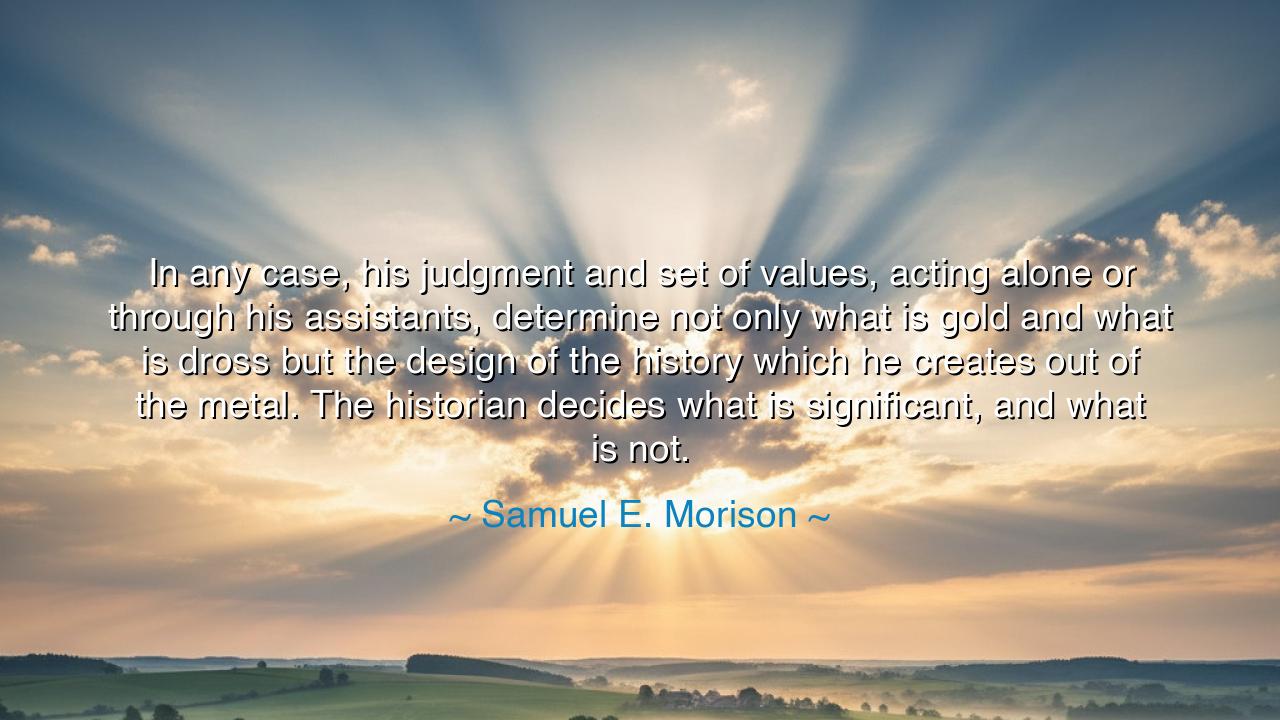
In any case, his judgment and set of values, acting alone or
In any case, his judgment and set of values, acting alone or through his assistants, determine not only what is gold and what is dross but the design of the history which he creates out of the metal. The historian decides what is significant, and what is not.






The words of Samuel E. Morison strike with the weight of ancient truth: “In any case, his judgment and set of values, acting alone or through his assistants, determine not only what is gold and what is dross but the design of the history which he creates out of the metal. The historian decides what is significant, and what is not.” In this, Morison reveals the sacred burden of the historian — not merely to record the passing of time, but to forge meaning from the chaos of human experience. Like an alchemist, he transforms the raw ore of memory into the pure metal of understanding. Yet, in the crucible of his mind, it is his judgment that determines which fragments of the past shall shine as gold, and which shall fade into the dust of oblivion.
From the dawn of civilization, the keepers of history have wielded this quiet power. Herodotus, who chronicled the wars of Greece and Persia, did not merely list events; he shaped a narrative that celebrated courage and warned against hubris. Centuries later, the Roman Livy framed the founding of Rome as a moral tale of virtue and decline. Each, in his way, decided what mattered — who would be remembered, and who would vanish from the scroll of time. For history, as Morison reminds us, is not the sum of all that has happened, but the story we choose to tell about what has happened.
The origin of Morison’s thought springs from his own life as both sailor and scholar, a man who understood that the sea of history is vast and treacherous. As a naval officer in World War II and a historian of exploration, he knew the temptation to let personal bias steer the ship. Yet he acknowledged that no historian is free from the winds of his own values. The act of choosing — of deciding which deeds, letters, or heroes to exalt — is itself a creation. Thus, even in striving for truth, the historian becomes an artist, sculpting the collective memory of mankind.
Consider the tale of Thucydides, the great chronicler of the Peloponnesian War. He did not praise Athens blindly nor condemn Sparta unjustly; instead, he crafted his work to reveal the moral decay that war breeds in all. In doing so, he gave the world more than a record — he offered wisdom. His narrative endures not because of its dates and names, but because of its insight into human nature. Here lies Morison’s warning: that the historian’s selection — the act of saying “this matters” and “this does not” — is the very act that shapes our understanding of ourselves.
We see this again in modern times. When the victors of war write their chronicles, they often crown themselves with glory and their enemies with shame. Only later do voices arise to challenge that version — the letters of soldiers, the tears of mothers, the cries of the forgotten. Thus, history shifts like a river’s course, each generation redefining significance according to its conscience. The gold of one age may be the dross of another. What Morison tells us, then, is that truth in history is alive, not fixed. It breathes and evolves with the minds that interpret it.
The lesson, dear listener, is one of humility and vigilance. Whether we are writers, teachers, or simple witnesses of life, we too are historians of our own world. Each day, we decide what to remember and what to forget, what to glorify and what to cast aside. These choices become the architecture of our personal history, shaping who we believe we are. Let us therefore be careful in our remembering — to weigh not only the triumphs, but also the wounds, for both are gold in the crucible of understanding.
If we would follow Morison’s wisdom, let us cultivate the virtue of discernment — to look upon the vast field of life and see beyond appearances. Let us ask: what is truly significant? What teaches, uplifts, or redeems? And when we tell our stories — whether to the world or to our own hearts — let us tell them with truth, with fairness, and with soul. For in the end, the historian’s task is not only to preserve the past, but to illuminate the path for those who walk after him.
Thus remember, as the ancients would say: the world is not remembered as it was, but as it is retold. The pen that writes history wields more than ink — it bears the power to shape destiny itself.






AAdministratorAdministrator
Welcome, honored guests. Please leave a comment, we will respond soon